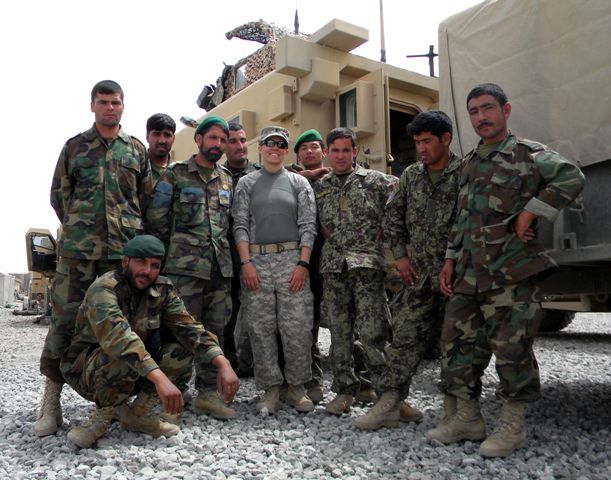While her neighbors slept Tuesday night, Kristen Rouse was awake for nine hours inside her Brooklyn apartment, texting fellow veterans and messaging with Afghans, working to get people through the crowded streets outside the Kabul airport and onto evacuation flights.
“We have command centers set up in our living rooms,” the former U.S. Army Major said. “We're like deployed to our living rooms, and we're like, oh, do you have a map of a Kabul airport?”
Rouse is one of hundreds of veterans trying to get Afghans who worked for U.S. forces out of the country, as they and their families face the threat of deadly revenge attacks by the now-ruling Taliban.

Members of Congress, too, are fielding hundreds of requests from constituents, including both former service members and Afghan residents who have family members still inside the country.
The scene outside the Kabul airport has become chaotic in recent days, with little U.S. help to get Americans or Afghan allies to airport gates safely, even if they have a notice to evacuate.
Rouse said the interpreters and families she was working with were unsuccessful Wednesday morning.
“They were in a throng of people where they were afraid they were going to be crushed. We had a very pregnant woman, we had many young children out there,” she described. “Security from the airport walls were firing into the crowd. Taliban was firing into the crowd.”
U.S. lawmakers are also working to get Afghans out, responding to requests from constituents. Several congressional offices confirmed to Spectrum News that they’ve received at least a handful of requests and are working with the State Department to flag the cases.
“We need to do everything we can to be as helpful as we can for people who deserve the right to be safe,” said Rep. Ted Deutch, D-Fla. “That's especially true for all of those who helped us over the past two decades. There's a lot of work for us to do.”
An aide for Rep. Michael Waltz, R-Fla., who served as a Green Beret in Afghanistan, said their office has received closer to 100 evacuation requests. Waltz has been vocal about the Afghanistan withdrawal and advocating for Afghans who worked for the U.S. military, such as interpreters, drivers and other employees.
But the typical process for members of Congress to help expedite cases has broken down since the U.S. Embassy in Kabul closed last week.
Another congressional aide told Spectrum News that their requests are no longer getting any response at all from state or embassy staff.
“What we're getting is an automated bounce back message from the embassy,” the staffer said.
“It’s difficult to figure out who to talk to. Essentially what we're doing is we're making the department aware that each of these cases is of interest,” they added. “And then it kind of goes into a black hole.”
The aide said paperwork is often sped up after they flag specific cases, but it’s unclear how the process works.
Rouse and the other veterans she’s working with were able to get eight people out early Wednesday, including six children. But that’s only a fraction of the number of Afghans on her list.
“We need to let people in and get them on the flights and then process their paperwork in a place where everybody's safe to do so,” she said. “What we do now is going to determine whether people live or die.”
Deputy Secretary of State Wendy Sherman said they are still sending out evacuation notices to Afghans who worked with the United States, including 800 more notices expected on Wednesday.
The department will also double the number of consular officers on the ground by Friday, Sherman told reporters.
But without safe transportation to Kabul’s airport and many allies afraid to cross Taliban checkpoints, it’s unclear how many could escape the country.
“It is obvious we are not close to where we want to be in terms of getting the numbers through,” Secretary of Defense Lloyd Austin said Wednesday. “We are going to get everyone that we can possibly evacuate, evacuated. I will do that as long as we possibly can, until the clock runs out or until we run out of capability.”



